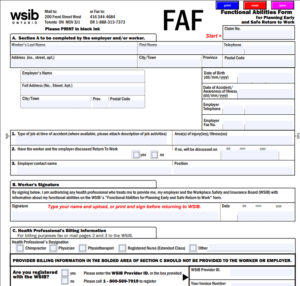A vocational evaluation is a comprehensive assessment conducted to determine an individual’s abilities, skills, interests, and aptitudes in relation to suitable employment options.
It is typically performed by vocational experts or professionals trained in career counseling, vocational rehabilitation, or vocational psychology. The primary goal of a vocational evaluation is to provide objective information and guidance regarding a person’s vocational potential and to assist them in making informed decisions about their career path.
It is often used in various settings, including vocational rehabilitation programs, job placement services, career counseling centers, and legal proceedings related to disability claims or workers’ compensation cases.
Assessments in Vocational Evaluations
During a vocational evaluation, the evaluator gathers information through multiple methods, which may include interviews, standardized assessments, work samples, observations, and review of medical records and educational history.
The evaluation may cover areas such as academic skills, work history, physical and cognitive abilities, personality traits, vocational interests, and values. Based on the findings of the vocational evaluation, the evaluator can provide recommendations for suitable career options, vocational training programs, workplace accommodations, and potential job modifications to enhance the individual’s chances of employment success.
The evaluation report can be utilized by individuals, vocational counselors, employers, and other relevant parties to assist in career planning, job placement, and vocational rehabilitation efforts.
Process of a Vocational Evaluation
A vocational evaluation is conducted through a systematic process that involves several steps.
Firstly, the evaluator conducts an initial interview with the individual seeking the evaluation. This interview helps gather background information, including the individual’s education, work history, skills, interests, and any limitations or disabilities that may affect their vocational options. Based on the individual’s needs and the purpose of the evaluation, the evaluator selects appropriate assessment tools.
These can include standardized tests, interest inventories, work samples, situational assessments, and functional capacity evaluations.
The specific assessments chosen may vary depending on the context and the individual’s unique circumstances. The individual then undergoes selected assessments. This may involve completing written tests, engaging in practical tasks or simulations, or participating in interviews or observations.
The purpose is to gather data on the individual’s abilities, aptitudes, interests, and limitations.
The evaluator reviews relevant medical records, educational records, and any other documentation that may provide additional insights into the individual’s abilities or limitations. This step helps the evaluator gather a comprehensive understanding of the individual’s background. In some cases, the evaluator may ask the individual to perform specific work-related tasks or provide work samples.
This hands-on approach allows the evaluator to assess the individual’s practical skills, work habits, and potential for specific job tasks.
The individual may also complete vocational interest inventories or questionnaires to determine their preferences and motivations related to various types of work. This information helps in identifying suitable career options.
Interpretation of Vocational Evaluation Results
In the interpretation stage, the evaluator analyzes the gathered data, integrates the information from various sources, and interprets the results.
This process involves comparing the individual’s abilities, aptitudes, interests, and limitations with the requirements of different occupations or vocational training programs. The evaluator then prepares a comprehensive report summarizing the assessment findings, interpretations, and recommendations.
The report typically includes an assessment of the individual’s vocational potential, suitable career options, vocational training recommendations, and any necessary workplace accommodations or modifications.
It’s also important to note that the specific steps and methods used in a vocational evaluation may vary depending on the evaluator, the purpose of the evaluation, and the context in which it is conducted.
Vocational Evaluations in Disability Management
A vocational evaluation can play a significant role in the administration of disability benefits by providing objective information and insights into an individual’s vocational capabilities and limitations.
In disability benefits programs, such as Long Term Disability Insurance providers or workers’ compensation, it is often necessary to establish that an individual has a disability that significantly impairs their ability to work. A vocational evaluation can provide an assessment of the individual’s vocational potential, considering their abilities, limitations, and transferable skills.
This information can help the benefits administrator in evaluating the extent of the disability and its impact on the individual’s employability.
Vocational Evaluations in Vocational Rehabilitation Services
Many disability benefits programs offer vocational rehabilitation services to help individuals with disabilities return to work or gain new employment.
A vocational evaluation can identify the individual’s vocational strengths, interests, and aptitudes, as well as any barriers or limitations they may face. This information can guide the development of a personalized vocational rehabilitation plan, including appropriate training, accommodations, or job placement services.
A vocational evaluation can assess an individual’s functional capacity to perform specific job tasks or types of work. It can also provide valuable information to disability benefits administrators in determining the individual’s ability to engage in substantial gainful activity (SGA).
It helps establish whether the individual can perform their previous job or any other job available in the national economy, which is an important consideration in disability benefits determination.
Role of Vocational Evaluations in Disability Benefits Determination
A vocational evaluation will also identify the individual’s transferable skills.
Skills acquired through previous work or education that can be applied to different occupations, and helps in determining alternative job options that align with the individual’s abilities and limitations. It also assists in evaluating the individual’s potential for vocational retraining or acquiring new skills that can lead to suitable employment opportunities. It provides objective documentation of the individual’s vocational potential, limitations, and rehabilitation needs.
This documentation can also serve as evidence in disability benefits applications, appeals, or legal proceedings, supporting the individual’s claim for benefits based on their vocational capabilities and employability.
Vocational evaluations help disability benefits administrators make informed decisions regarding an individual’s eligibility for benefits, vocational rehabilitation planning, and support services.
It provides an objective assessment of the individual’s vocational abilities, limitations, and potential, contributing to a fair and accurate administration of disability benefits programs.
Frequently Asked Questions About Vocational Evaluations
What qualifications should a vocational evaluator possess?
Answer: A vocational evaluator typically has a background in vocational rehabilitation, psychology, or career counseling. They should have a deep understanding of job markets, occupational requirements, and career development strategies. They may also possess certifications or credentials in vocational evaluation, rehabilitation counseling, or related fields. Some evaluators may also have advanced degrees in psychology, rehabilitation counseling, or vocational evaluation.
How long does a vocational evaluation process typically take?
Answer: The length of a vocational evaluation process can vary based on several factors, including the complexity of the individual’s case, the number of assessments required, and the individual’s availability and cooperation. Typically, a vocational evaluation may take a few hours to several days spread out over a period of time.
Can a vocational evaluation be beneficial for individuals without disabilities?
Answer: Yes, a vocational evaluation is not exclusively for individuals with disabilities. It can be beneficial for anyone seeking career guidance or exploring employment options. This can include students entering the workforce, individuals considering a career change, or unemployed individuals looking for suitable job opportunities.
What is the difference between a vocational evaluation and a job placement service?
Answer: A vocational evaluation is a comprehensive assessment of an individual’s abilities, skills, interests, and aptitudes to provide objective information about their vocational potential. The findings of a vocational evaluation can guide career planning and job placement. On the other hand, a job placement service actively assists individuals in finding employment, often by matching their skills and interests with available job opportunities. While the two can work hand in hand, they offer different services.
How does a vocational evaluation contribute to a successful return-to-work plan?
Answer: A vocational evaluation provides valuable insights into an individual’s vocational abilities, interests, limitations, and transferable skills. This information can help in creating a personalized return-to-work plan that considers the individual’s unique needs and capabilities. It can guide decisions about suitable job options, necessary workplace accommodations, vocational retraining needs, and strategies to overcome potential employment barriers. Thus, a vocational evaluation can be a vital component of a successful return-to-work plan.






